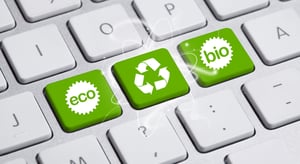The demand for technology in businesses has increased over the years. Today, staff prefer working in modern workplaces with a focus on technology. No contemporary office is without its high-speed internet access and tech equipment to enhance productivity and collaboration.
The expectation for CSR (Corporate Social Responsibility) compliance in organisations has led to staff putting management under pressure to tackle environmental damage.
The e-waste problem
It is impossible to discuss e-waste management and dismiss environmental health. A 2021 census by the United Nations states; a single person is estimated to produce 7.6 kg of e-waste resulting in 57.4 million tons generated globally.
The UN has coined this epidemic as a ‘tsunami of E-waste rolling across the world’. Mass production, overconsumption, shorter product lifespans, and inadequate measures for IT asset recycling require immediate action.
The appropriate recycling method for e-waste disposal depends on manually breaking down electronic equipment. The side effects - inhaling harmful substances such as lead, mercury and dust – can cause irreparable damage to health.
This form of recycling is more common in developing countries, where disassembling toxic material exposes workers to such health issues. Although companies are at different stages in their e-waste management journey, the size of its global impact sets the need for rapid action.
The initial steps are to identify material risks presented by e-waste, evaluate the actions required, and plan out a strategy for the future, regardless of where a business is in their understanding of IT equipment lifecycles.
Waste Management
Waste Electrical and Electronic Equipment (WEEE) regulations are there to tell institutions about environmental impact caused by end-of-life electronics. What about businesses needing a streamlined process to help them meet their recycling responsibilities? That is where the WEEE Directive takes effect - raising awareness of the environmental concerns impacting the industry.
Organisations must meet targets for decreasing global waste by investing in reconditioned technological assets. These include:
- Desktop and computers.
- Telephones (landline phones and video conference equipment).
- Mobile devices (smartphones for work).
- Tablets.
- Laptops.
- Printers, scanners, and photocopiers.
- Wi-Fi routers.
Scrutinising the modern workplace
The modern workplace is a ‘work in progress’. Current discussions surrounding reduced working hours, trialling the 4-day work week and IT Asset Disposition (ITAD) in offices are known areas of improvement.
Since the pandemic, many corporations are taking a reflective approach to businesses and looking at various ways of factoring wellness and improved efficiency into their working environment. Employee wellness encompasses many areas outside of mental well-being and stress management. Working in an industry advocating an eco-centred message has been proven to enhance company culture and establish a shared goal.
More than ever, organisations must consider how their processes and business operations impact on the world around them. Individuals, including those in the workforce, have a social responsibility to protect their environment and anybody affected by e-waste streams.
Becoming ITAD-conscious as an institution significantly reduces redundant electronics and their in-office impact. Refusing to use proper means of disposal not only damages the planet but corporate and brand reputation too. Organisations are becoming more conscious about their environmental impact and the extent that bad PR hurts their bottom line.
Sustainable Offices and CSR
Corporate Social Responsibility (CSR) is a catch-all term describing the degree to which organisations ethically conduct their business. It covers human rights plus social, economic, and environmental impacts to help build an inclusive workplace structure.
The idea of the ‘sustainable office’ came about during post-covid dialogues on how society should take necessary steps towards reforming the health of our office spaces.
Flexible working and Repurposed Tech
Balancing the pros and cons of remote working has proven challenging. In a study led by the Sustainability Times, 56% of employees have expressed enjoying a balance between in-office and at-home work. Hybrid work gets a majority vote from staff, despite employers leaning towards more time in the office for management purposes.
Both sides agree though that flexible working might be the answer to reduce company emissions from electronic equipment.
An estimated 70% of Laptops are reusable, but businesses still resist extending the life of their tech. Refurbished IT allows you to do this while decreasing operational costs without any compromise to services.
Reconditioned devices aren’t always ‘inferior’ or ‘used’. Many companies discover that second-hand tech is often brand new.
Whether you’re looking to trade-in or transfer data, our secure PC Wipe/Diagnostics and Data wipe software is guaranteed to extend the life of your device.
Unlock the potential of your business's smartphone recycling efforts. Gain valuable insights from our comprehensive white paper, offering proven grading strategies for maximum efficiency. Download now and elevate your recycling ROI.



COMMENTS